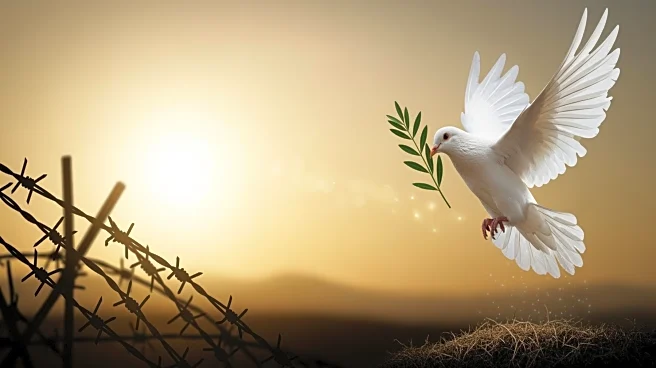What's Happening?
Israel has received the remains of a deceased hostage from Gaza, identified as Joshua Loitu Mollel, an agricultural student from Tanzania. The transfer was facilitated by Hamas through the Red Cross, marking
the third such transfer this week. Mollel was abducted during the October 7 attacks on Kibbutz Nahal Oz. This development leaves six deceased hostages' bodies still in Gaza. Israel is also gathering intelligence on the location of the longest-held remains, believed to be those of Lt. Hadar Goldin, killed in 2014. His remains are suspected to be in Rafah, southern Gaza, near an area occupied by Hamas militants. Prime Minister Benjamin Netanyahu is considering an Egyptian proposal for safe passage for militants to Hamas-held territory, but no decision has been made yet.
Why It's Important?
The return of hostages' bodies is a sensitive issue for Israel, impacting its relations with Hamas and influencing public sentiment. The identification of Mollel's remains highlights the ongoing humanitarian and diplomatic challenges in the region. The situation underscores the complexity of negotiations and the delicate balance Israel must maintain in its security operations. The potential decision on granting safe passage to Hamas militants could affect regional stability and Israel's security strategy. The broader implications include the impact on peace efforts and the humanitarian situation in Gaza, where aid distribution remains a critical concern.
What's Next?
Prime Minister Netanyahu's decision on the Egyptian proposal could significantly affect the dynamics between Israel and Hamas. The ongoing identification and return of hostages' bodies may lead to further negotiations or confrontations. Israel's security operations in Gaza, particularly targeting Hamas pockets, will continue to be a focal point. The international community may increase pressure on both parties to ensure humanitarian aid reaches those in need. The situation remains fluid, with potential for both escalation and diplomatic breakthroughs.
Beyond the Headlines
The ethical and humanitarian dimensions of hostage negotiations are profound, affecting families and communities on both sides. The return of remains is not only a political issue but also a deeply personal one for the families involved. The situation in Gaza reflects broader geopolitical tensions and the challenges of achieving lasting peace in the region. The humanitarian crisis in Gaza, exacerbated by ongoing conflicts, requires sustained international attention and support.










